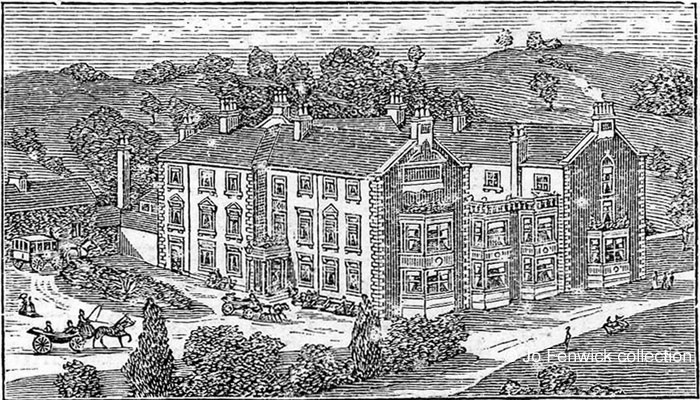|
Images Index> Matlock Bath, 20th and 21stC Images> This page |
| Matlock Bath: New Bath Hotel (1) |
| Matlock Bath : Twentieth Century Photographs, Postcards, Engravings & Etchings |
|
||||||||||||||||||||||||||
The earliest public notice found that mentioned property sales at the New Bath was in 1758[1]. Isaac North ran the establishment for about 22 years. He was followed by William Lovett in 1867 and George Saxton took over in 1788[1]. His son, George Withers Saxton, succeeded him. In 1852 the hotel was described by William White as: "pleasantly situated at the South end of the Tufa Terrace, owed its existence to the second hot spring, that was discovered some years after the Old Bath. It has been enlarged at various periods, and now forms three sides of a quadrangle, and is a large and commodious establishment, with beautiful grounds[2]". When Miss Ivatts and Mrs. Jordan took over the management, five years afterwards, Francis White thought it was "a spacious building, replete with every comfort"[3].
Perhaps the modernisation Bryan referred to included changes to the front of the hotel in the late nineteenth century which can be seen on the modern building. An 1888 advertisement from Thomas Tyack's time at the hotel announced that the building had been extended[6]. Window mouldings, of painted stucco, were added above and around the window frames whilst the sash windows were made up of four panes of glass instead of the two shown in mid nineteenth century images. Quoins were also added to the corners of the building. The hotel sign eventually went from above the first floor windows to a long sign on the edge of the roof, although this is no longer on the building today.
There is more about the New Bath Hotel
|
||||||||||||||||||||||||||
1. Top post card. "New Bath Hotel, Matlock Bath" published by The R. A. Postcard Company Ltd of London, Foreign, No 10378. Image shown on Michael Portillo's "Great British Railway Journeys" on BBC2 on 25 January 2010. 2. Engraving from: Famous Derbyshire Health Resorts. The Matlocks, about 1892 - Part 1, © Jo Fenwick collection. 3. Second post card. "New Bath Hotel, Matlock" published by Photochrom Co Ltd, Tunbridge Wells, Kent for Trust Houses Ltd. Not posted. 4. "New Bath Hotel, Matlock". also published by Photochrom Co Ltd, Tunbridge Wells, Kent for Trust Houses Ltd. Not posted. A pencilled note: "Lunch Sunday 12th May '52" is on the back. All three postcards in the collection of, provided by and © Ann Andrews. Researched by and written by and © Ann Andrews. Intended for personal use only. |
||||||||||||||||||||||||||
References (coloured links are to transcripts and information elsewhere on this web site): [1] Matlock Public Notices & Announcements, 1758, 1767 and 1788. William Lovatt is named as a landowwner in the parish in Eighteenth Century Lists: Poor Rate, 1784 (part 2) [2] "Gazetteer and General Directory of Sheffield, and all the Townships, Parishes and Villages Within the Distance of Twenty Miles Round Sheffield" by William White, published Sheffield, 1852. [3] White, Francis (1857) "History, Gazetteer and Directory of the County of Derby ..." pub. Francis White & Co. Sheffield. See lists of names in the on site transcript [4] Bryan, Benjamin (1903) "History of Matlock - Matlock, Manor and Parish" London by Bemrose & Sons, Limited. [5] Ward Lock & Co's "Matlock, Dovedale, Bakewell and South Derbyshire", Illustrated Guide Books of England and Wales (1932-3), p.35-6 [6] Tyack's advert, published in Black's Guide, can be see on Matlock
Bath, Derbyshire - The Switzerland of England |
||||||||||||||||||||||||||
























